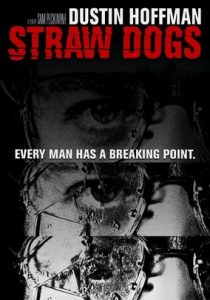Straw Dogs-1971
Director Sam Peckinpah
Starring Dustin Hoffman, Susan George
Top 250 Films #215
Scott’s Review #733
Reviewed March 19, 2018
Grade: A
Straw Dogs (1971) is famed director Sam Peckinpah’s most startling and most controversial film. Hardly an easy watch, it will provoke disturbing and uneasy reactions, but it is a work of art, teetering on the edge of being an all-out art film.
Viewers will cringe during intense scenes but will also marvel at the film’s mastery of this classic, bringing on a whirlwind roller coaster ride as story elements spiral out of control to a frenetic, powerful climax.
Intellectual American mathematician, David Sumner (Dustin Hoffman), moves with his sexy British wife, Amy (Susan George), to a Cornish countryside, the town in which she grew up, where they proceed to encounter problems, both within their marriage, and external factors, as an angry mob of blue-collar workmen, threaten their home life.
When non-violent David is pushed to the limit, questions of morality are brought to light, as Amy faces her demons and bouts with brutality and victimization.
The film, made in 1971, pushes the envelope significantly in its display of violence.
Several years earlier, 1967’s Bonnie and Clyde and Peckinpah’s own The Wild Bunch (1969) were the films that really got the ball rolling. Still, Straw Dogs continues the trend of the brutal violence that overtook American cinema at the time.
While watching the film for the second time, I was struck hard by the feeling that I was watching something important.
Amy’s rape scene is the most brutal scene of all to watch for the sheer way in which it can be interpreted. Later, when Amy replays the scene in her mind, the audience is forced to relive the experience.
Not content to only include the rape scene, Peckinpah wants the viewer to dissect the scene- the fact that Amy is assaulted by not one, but two men, and reacts differently to each of them, is the key here.
The scene is complex in that Venner, the first assailant, is hunky and presumed to be a former beau, and she eventually relents to his advances, but does she enjoy the act? When Scutt enters the picture, however, things turn from tender and ambiguous to violent and dirty.
Undoubtedly, an influence on director Quentin Tarantino is the final sequence of the film- a scene fraught with tension, violence, and grit.
Now trapped in their house amid a mob of angry, drunk men, hell-bent on revenge, David and Amy must both bond with each other and match antics with the men.
I experienced visions of 2015’s The Hateful Eight through the claustrophobic, cabin-like setting and the quick edits that Peckinpah uses throughout the film.
A sad scene, and at least a portion of the reason for the townsfolk’s rage, is a scene reminiscent of Frankenstein when a hulking and mentally challenged man accidentally harms a young girl. Not knowing his strength and meaning to protect the girl instead of killing her, the menfolk of the town respond in a nightmarish and witch-hunt manner.
Suddenly, David becomes the defender and protector of this man.
David’s character change is interesting, and the great Hoffman adds layer upon layer of complexity to the role. At first, a peaceful man, due to circumstances, he soon becomes the assailant, creating traps and weapons, intent on maiming his prey.
Hardly a violent man, this change of character is evident in our earlier scene, where David nurses a wounded bird.
In addition to Hoffman’s traditionally outstanding performance, Susan George delivers the perfect blend of bitchiness, spoiled-brat tantrums, and, later, guilt-ridden angst and fear.
The villains are perfectly cast and believable as bored, simple-minded, and horny, small-town boys just itching for trouble.
Lush is the gorgeous United Kingdom countryside featured in Straw Dogs, as frequent exterior scenes are shot, revealing lavish and plush mountainous areas- the sweeping beauty of the landscape counterbalancing the brutality shown in other sections of the film.
Mixing super quick editing with a dark, compelling screenplay, with underlying themes of questioning one’s manhood, Straw Dogs is a provocative and edgy tale of violence and revenge in a small town, that gives new meaning to the fear of “home invasion” and feeling vulnerable.
Thanks to a great cast and lots of other facets, Straw Dogs (1971) is a timeless (and brutal) treasure.
Oscar Nominations: Best Original Dramatic Score
